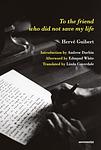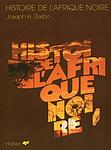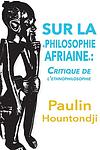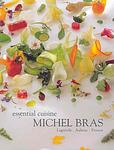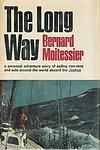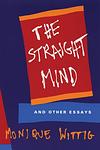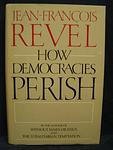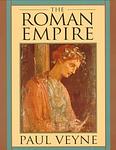The Greatest French "Nonfiction" Books Since 1970
Click to learn how this list is calculated.
This list represents a comprehensive and trusted collection of the greatest books. Developed through a specialized algorithm, it brings together 290 'best of' book lists to form a definitive guide to the world's most acclaimed books. For those interested in how these books are chosen, additional details can be found on the rankings page.
Genres
Countries
Date Range
Reading Statistics
Click the button below to see how many of these books you've read!
Download
If you're interested in downloading this list as a CSV file for use in a spreadsheet application, you can easily do so by clicking the button below. Please note that to ensure a manageable file size and faster download, the CSV will include details for only the first 500 books.
Download-
1. Discipline and Punish by Michel Foucault
This book delves into the historical evolution of the penal system, examining how Western societies have transitioned from a regime of violent, public physical punishment to a more subtle form of surveillance and control. It introduces the concept of the "panopticon," a metaphor for modern disciplinary societies that exercise power through observation and normalization rather than through overt physical coercion. The work explores the relationship between power, knowledge, and social control, arguing that disciplinary mechanisms are embedded in various institutions, such as schools, hospitals, and prisons, shaping individuals and maintaining order in society.
-
2. To The Friend Who Did Not Save My Life by Hervé Guibert
The book is a candid and harrowing autobiographical novel that chronicles the life of a man grappling with the devastating impact of AIDS during the early years of the epidemic. Through a blend of fact and fiction, the narrative delves into the protagonist's personal experiences with illness, the medical establishment, and the emotional complexities of friendship and mortality. As he confronts his own declining health, the protagonist reflects on the relationships with those around him, including a close friend who is also facing the disease, and the betrayal he feels when a promised miracle cure fails to materialize. The novel is a raw and poignant exploration of the human condition in the face of an unforgiving illness.
-
3. Histoire De L'afrique Noire by Joseph Ki-Zerbo
"Histoire De L'afrique Noire" is a comprehensive exploration of the history of Black Africa, written by Joseph Ki-Zerbo. The book delves into the origins of African civilizations, the impact of colonization, and the struggle for independence. Ki-Zerbo analyzes various aspects of African history, including political, economic, and social developments, highlighting the contributions of African leaders and the challenges faced by the continent. This informative and engaging work provides a valuable resource for anyone seeking a deeper understanding of the rich and complex history of Black Africa.
-
4. L'étrange Destin De Wangrin by Amadou Hampâté Bâ
"L'étrange Destin De Wangrin" by "Amadou Hampâté Bâ" is a captivating narrative that delves into the life of Wangrin, a complex and enigmatic figure in West African society. Through a series of interconnected stories, the book explores Wangrin's rise from a humble clerk to a powerful and influential figure, as well as his eventual downfall. Set against the backdrop of colonialism and cultural clashes, the novel offers a thought-provoking exploration of identity, power dynamics, and the consequences of one's choices.
-
5. Sur La Philosophie Africaine by Paulin Hountondji
"Sur La Philosophie Africaine" is a thought-provoking exploration of African philosophy by Paulin Hountondji. The book challenges the prevailing notion that African thought is inherently inferior to Western philosophy, advocating for a reevaluation of African intellectual traditions. Hountondji critically examines the impact of colonialism on African philosophy and argues for the development of a truly African philosophical framework that embraces cultural diversity and challenges Eurocentric biases. Through his insightful analysis, Hountondji highlights the richness and complexity of African thought, making a compelling case for its recognition and inclusion in the global philosophical discourse.
-
6. Memoirs by Raymond Aron
The book in question is an intellectual autobiography by a prominent French philosopher and sociologist, chronicling his life from his early years through the tumultuous events of the 20th century. It delves into his experiences during World War II, his observations on the Cold War, and his relationships with other notable intellectuals of his time. The author reflects on his philosophical and political evolution, offering insights into his analytical approach to history, politics, and society. His memoirs serve as a window into the mind of a thinker deeply engaged with the ideological and historical challenges of his era, providing a personal perspective on the broader intellectual currents that shaped the modern world.
-
7. Distinction by Pierre Bourdieu
"Distinction" is a sociological analysis that explores the ways in which the tastes and preferences of individuals are related to their social positions and the structures of power within society. The book argues that aesthetic choices, ranging from music and art to food and drink, are not just indicators of personal preference but are deeply intertwined with social class and the distinctions that classes make to set themselves apart from others. Through a detailed examination of French society, the author demonstrates how cultural consumption patterns are formed and how they function as markers of social status, contributing to the reproduction of social hierarchies and class relations.
-
8. Essential Cuisine by Michel Bras
"Essential Cuisine" is a comprehensive guide to gourmet cooking, written by a renowned French chef. The book provides readers with recipes that highlight the chef's innovative and unique approach to cooking, focusing on the use of fresh, local ingredients. The book also includes stunning photography of the dishes and the chef's home region, making it as much a visual feast as a culinary one. It is a must-have for anyone interested in haute cuisine and the art of fine dining.
-
9. The Long Way by Bernard Moitessier
The book is a captivating narrative of a sailor's solo circumnavigation of the globe during a historic yacht race. Rejecting the trappings of fame and competition, the sailor chooses to continue sailing beyond the finish line, embracing the sea's vastness and his deep connection with nature. His journey becomes not just a test of physical endurance but a spiritual quest, as he reflects on life, the modern world, and the harmony found in simplicity. Through storms, wildlife encounters, and the solitude of the open ocean, the sailor's tale is a profound meditation on the human spirit and our relationship to the Earth.
-
10. Species Of Spaces And Other Pieces by Georges Perec
This book is a collection of essays and musings that explore the concept of space in its myriad forms, from the intimate to the vast, the mundane to the conceptual. The author employs a variety of literary styles and devices to dissect the spaces we inhabit, such as the page upon which one writes, the bed one sleeps in, the apartment, the street, and the city. Through this examination, the work delves into themes of memory, absence, and the everyday, encouraging readers to perceive the spaces around them in new and thought-provoking ways. The text is both playful and philosophical, inviting a deeper reflection on the spaces we often take for granted and the ways in which they shape our experiences.
-
11. The Straight Mind by Monique Wittig
The book is a collection of feminist essays that challenge the conventional understanding of gender and sexuality, positing that the concept of "woman" is a social construct created by a heterosexual society to uphold a binary gender system. The author argues that this system perpetuates the oppression of women and LGBTQ+ individuals by reinforcing the straight mind, a heteronormative way of thinking that marginalizes any form of difference. Through a radical rethinking of language, literature, and social structures, the essays advocate for a new feminist perspective that seeks to dismantle the straight mind and create a society where all forms of identity and expression are valued equally.
-
12. Camera Lucida by Roland Barthes
The book in question is a seminal work in the field of photography theory, blending personal reflection with philosophical investigation. The author delves into the nature of photography, exploring the medium's ability to capture the essence of a moment and its subjects. Through a two-part analysis, the author introduces concepts such as the studium and punctum to articulate the layers of meaning and emotional response elicited by photographs. The work is also a meditation on loss and memory, inspired by the author's search for the essence of his late mother in her photographs. The text is both an intimate journey and a critical examination of the power of images to evoke and preserve the fleeting nature of existence.
-
13. How Democracies Perish by Jean François Revel
This book provides a deep analysis of the threats faced by democracies, specifically from totalitarian regimes. The author argues that democracies are often their own worst enemies, being too tolerant and indecisive, which can lead to their downfall. He further discusses how democracies can be manipulated by totalitarian regimes through propaganda and misinformation. The book serves as a warning and a call to action for democratic societies to recognize these threats and take steps to defend their values and institutions.
-
14. Montaillou by Emmanuel Le Roy Ladurie
The book is a detailed historical study of the lives of the inhabitants of Montaillou, a small village in the French Pyrenees, during the early 14th century. Based on the meticulous records of Jacques Fournier, the Bishop of Pamiers who later became Pope Benedict XII, the book explores the daily lives, beliefs, and social structures of a medieval community. It particularly focuses on how the villagers, including peasants and shepherds, interacted with the Cathar heresy and the Inquisition's efforts to suppress it. The work provides an in-depth look at medieval European rural life, religious practices, and the impact of ecclesiastical authority on individual lives.
-
15. The Films In My Life by Francois Truffaut
"The Films In My Life" is a collection of essays and reviews by a celebrated French filmmaker, offering insights into the world of cinema from the 1950s through the 1970s. In this book, the author discusses a wide range of films, from classics to lesser-known works, providing personal and critical perspectives that reflect his experiences as both a filmmaker and a film critic. The essays not only delve into the artistic and technical aspects of the films but also explore the influence of cinema on society and the individual, showcasing the author's deep love for and understanding of the medium.
-
16. The Roman Empire by Paul Veyne
"The Roman Empire" delves into the intricate and expansive history of Rome, exploring its political, social, and cultural dynamics. The book provides a detailed examination of how Rome evolved from a small city-state to a vast empire, influencing the Western world profoundly. The author analyzes the mechanisms of power and governance within the empire, the role of military conquests and political alliances, and the complex interactions between Roman and other cultures. Additionally, the narrative discusses the daily lives of Roman citizens, the economic frameworks, and the philosophical and artistic contributions that shaped the legacy of the Roman Empire.
-
17. The History Of Sexuality by Michel Foucault
"The History of Sexuality" explores the complex relationship between power and sexual discourse, arguing that since the 17th century, Western societies have not repressed sexuality but rather incited it, making it an object of public discourse. The author examines how power operates through the production of knowledge about sex and uses this perspective to challenge the conventional narrative that society has been progressively liberating sexuality from repression. The book delves into the ways in which sexual norms and power relations are intertwined, suggesting that the discourse on sexuality is a tool of power used to regulate both individual bodies and entire populations.
-
18. The Pleasure of the Text by Roland Barthes
"The Pleasure of the Text" is a philosophical and literary exploration of the act of reading. The author presents the idea that there are two types of pleasures associated with reading: "pleasure of the text" and "bliss." The former is a comfortable enjoyment derived from the familiar, the latter a disruptive and challenging joy that comes from the new and unexpected. The book delves into the interaction between reader and text, highlighting the role of the reader in interpreting and creating meaning, and challenges traditional notions of authorship and textual authority.
-
19. Cinema And History by Marc Ferro
"Cinema and History" explores the intricate relationship between cinema and historical events, analyzing how films reflect and shape public perceptions of history. The book delves into the ways filmmakers from various cultures and periods have portrayed historical figures and incidents, highlighting the influence of political, social, and cultural contexts on these depictions. It also examines the role of propaganda, the impact of historical films on collective memory, and the differences between cinematic and historical narratives. Through a critical lens, the author discusses the potential of cinema to both distort historical truth and provide profound insights into historical realities.
-
20. This Sex Which Is Not One by Luce Irigary
"This Sex Which Is Not One" explores the complex ways in which women have been represented in Western discourse, particularly focusing on the limitations imposed by a male-centric language that defines women primarily in terms of difference from men. The author critiques traditional theories of psychoanalysis and philosophy, arguing that they perpetuate a binary view of gender that fails to capture the true fluidity and multiplicity of female identity. Through a series of essays, the text advocates for a new form of feminist thinking that acknowledges and values women's sexuality and linguistic expression as plural, fluid, and dynamic, challenging the structures that have historically marginalized women's voices and experiences.
-
21. Poussières D'étoiles by Hubert Reeves
"Poussières d'étoiles" is a poetic exploration of the cosmos and our place within it, delving into the intricate connections between the universe and the microscopic elements that compose life on Earth. The book weaves together astronomy, physics, biology, and philosophy to illustrate how the atoms that make up our bodies were once part of ancient celestial phenomena. Through accessible language and engaging storytelling, the narrative takes readers on a journey from the Big Bang to the evolution of life, emphasizing the awe-inspiring reality that we are literally made of stardust, sharing a fundamental bond with the vast, dynamic universe around us.
-
22. Stranglehold On Africa by René Dumont
"Stranglehold on Africa" is a critical examination of the post-colonial economic and political challenges faced by African nations. The book delves into the detrimental effects of foreign aid dependency, the exploitation of African resources by Western countries, and the pervasive corruption and mismanagement within African governments. The author argues that these factors have collectively hindered sustainable development and perpetuated a cycle of poverty and underdevelopment. Through a blend of analysis and firsthand observation, the book calls for a reevaluation of international policies and aid strategies, advocating for more equitable and sustainable approaches to supporting Africa's self-sufficiency and growth.
-
23. The Hour Of Our Death by Philippe Ariès
"The Hour of Our Death" delves into the profound and evolving relationship between humanity and death from the early Middle Ages to the present. The book presents a detailed historical analysis of attitudes toward death, revealing how cultural, social, and religious elements have shaped human responses to mortality. It explores the rituals of dying and the customs of mourning, highlighting the transition from a familiar acceptance of death's constant presence in daily life to its modern sequestration and medicalization, which has altered but not diminished its profound impact on the human psyche and society.
-
24. Prisoner Of Love by Jean Genet
"Prisoner of Love" is a non-fiction book that blends memoir, history, and philosophical reflection. It chronicles the author's experiences in the late 1960s and early 1970s among Palestinian fedayeen (guerrilla fighters) and later, in the mid-1970s, with the Black Panthers in Jordan. The narrative delves into the daily lives of these revolutionaries, their struggles, and the author's own reflections on issues of love, loyalty, and identity. Through his immersive and poetic prose, the author explores the complexities of political commitment and the human condition, offering a deeply personal yet universally resonant account of solidarity and resistance.
-
25. Capital in the Twenty-First Century by Thomas Piketty
This book provides a comprehensive analysis of the dynamics of capital accumulation and distribution over the last few centuries. The author argues that the rate of capital return in developed countries is persistently greater than the rate of economic growth, leading to high levels of wealth inequality. The book further suggests that the level of income inequality is not primarily a result of differences in individual labor income but rather the result of differences in capital ownership and the income derived from it. The author proposes a global tax on wealth to prevent soaring inequality.
Reading Statistics
Click the button below to see how many of these books you've read!
Download
If you're interested in downloading this list as a CSV file for use in a spreadsheet application, you can easily do so by clicking the button below. Please note that to ensure a manageable file size and faster download, the CSV will include details for only the first 500 books.
Download
